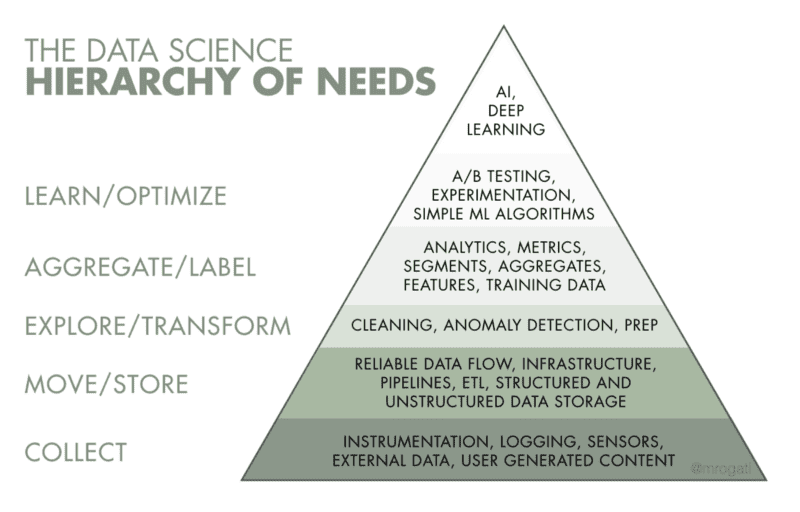Assuming you want to maximize how quickly you learn and work towards becoming a senior data scientist, I would say that your best bet would be to avoid beginning at early startups. Instead, your best bet would be to work at a more established startup, a medium-sized company, or a consulting firm. We’ll weigh the pros and cons of each below.
You want to work for a company that is a bit more established because they will actually have data for you to work with and the infrastructure for analytics or for putting machine learning into production.
Consider the AI Hierarchy of Needs

Source: Hackernoon - The AI Hierarchy of Needs by Monica Rogati
Not all companies will need to use AI or deep learning, but to do any kind of data science or machine learning, a company will need a solid foundation that gets the raw material to work with. This involves collecting data and building the infrastructure and pipelines to prepare the data, all of which falls into the realm of data engineering.
At an early startup, you likely will need to help establish this foundation. Make sure you know the scope of work that a company expects you to do. Having misaligned expectations or not knowing the kind of data work you will be doing is one of the sources of frustration that push data scientists to leave their current position.
If you’re interested in working at a startup, I would say that your best bet would be to look at one that is farther along in their funding and development. Hunter Walk defines mid-stage startups as companies who have received Series B or Series C funding. He recommends mid-stage startups as the best first job in tech.
Let’s compare a few of your options below. These are generalizations, so you’ll have to weigh the merits of a particular organization to make a more informed decision. Depending on how self-directed you are and what you’re looking for in terms of career development, some pros will actually be cons and vice-versa.
Early Startups
Pros:
- Your contributions likely to make large impact to the company
- Broad development as a generalist
- Be a part of realizing a company’s lofty or meaningful mission
Cons:
- High risk of failing
- Not likely to be ready for data science
- In charge of your own development
- Difficulty maintaining work/life balance
Mid-stage Startups
Pros:
- More data ready for analysis or model building
- Sustainability from the runway provided by funding
- Larger data team
- Contributions still big impact on company
- More chance for mentorship
Cons:
- May still be in early phase of building the data foundation
- If VC-funded, mission of company changes
- Risk of company failing to reach scale or have successful exit
Large, Established Organizations
Pros:
- Defined, specialized data roles
- Work with massive amounts of data
- Work with more experienced or world-class data scientists
- Better work/life balance
Cons:
- More risk-adverse
- More bureaucracy
- Slower pace
- Work on fewer projects or technologies
Consulting Firm
Pros:
- Work with different companies from different industries
- Use a broad range of technologies and methods
- Tend to work on projects higher up in the “AI Hierarchy of Needs”
Cons:
- Don’t develop deeper, industry-specific business knowledge
- May need to build from the ground up (see cons of early startups)
Summary
For your first job as a data scientist, I would recommend against early startups, but funded startups in their growth phase is a great option for rapid learning. You’ll have broader responsibilities, which will give you experience with the different phases of data science projects. You’ll also learn what kind of work you like to do, which will inform your decision about specialization. Consulting firms give you similar skill development with the added feature of working across different industries. If you prefer to have more guidance, larger companies provide more structure and definition.
Further Reading
Robert Chang has a great article on his journey working with early startups to a mature tech company: Doing Data Science at Twitter
Emily Robinson and Johnathan Nolis have a list of 12 red flags with helpful sample questions to ask during an interview that indicate whether a company may be a bad environment for data science: Red Flags in Data Science Interviews
Comparing startups with large companies:
- Working at a startup vs. working at a large, established company: what to expect
- Start-ups versus Big Companies
- Which is better, a startup or a big company?
Originally published on Quora.